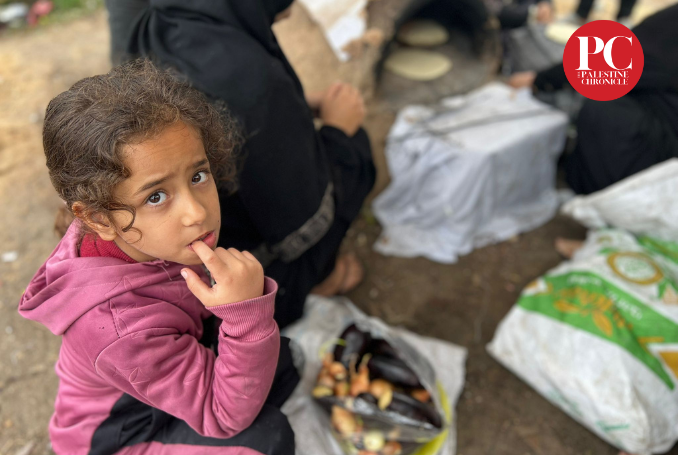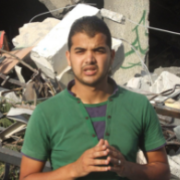
“There is no flour in Gaza, and we are on the brink of famine. For days, my family and I have been living on water.”
“My father, mother, sister, and two of my sons were martyred. They were transferred to the Al-Aqsa Martyrs Hospital, and taken directly from the hospital to the graveyard. My sisters, my wife, and my aunts were not able to say their goodbyes.” This is how Mohammad Abu Attiyeh described his family’s experience during the Israeli aggression, which was now in its 91st day.
Mohammad Al-Khatib lamented, “My brother was martyred, and we prayed for him in the hospital before heading straight to the graveyard. Many relatives and loved ones were denied a proper farewell by the occupation.”
“The hospital has a large number of martyrs, limited space, and no electricity for the refrigerators. We rush to bury them to prevent their bodies from decomposing, honoring them with a proper burial.”
Evading Death
Eyewitnesses reported that the occupation forces destroyed most of the Ain Jalout towers southeast of the Nuseirat refugee camp, in the central Gaza Strip, on the early morning of January 3.
Nuseirat resident, Abdallah al-Haj, survived the attack. He shared the horrific experience with the Palestine Chronicle.
“I live close to the Ain Jalout Towers,” he said. “We experienced a very harsh night on Wednesday, as the occupation heavily bombed the whole complex, and the shelling continued until the early hours of Wednesday.”
Over 85 percent of Gaza’s population are now refugees in their own land, according to the UN Refugee Agency UNRWA.
The Palestine Chronicle visited the camps of displaced Palestinians in southern #Gaza pic.twitter.com/UpcF3Yy1d7
— The Palestine Chronicle (@PalestineChron) January 5, 2024
“The bombardment forced thousands of families to evacuate. The bombing resulted in dozens of casualties and injuries, causing thousands of families residing in the area of Camp 2 in Nuseirat to flee to Deir Al-Balah,” al-Haj added.
“Thousands of people carrying their belongings are walking in the streets heading south of the Strip to escape Israeli bombardment. There is no safe place in Gaza. The occupation has violated all areas, and there are no sanctities in the vocabulary of the criminal occupation. The towers have been turned into a pile of rubble.”
Mohammad Awaja is another member of the neighborhood. Speaking with the Palestine Chronicle, Awaja lamented, “We have lived in the Ain Jalout Towers for over 20 years, and we have a strong connection to this area.”
“All of our neighbors live together as one family. The occupation destroyed the place where we spent our childhood and youth, turning the area, dozens of towers, and houses into a pile of stones and debris, causing dozens of families to be displaced without shelter,” Awaja said.
Enduring Hunger
“There is no flour in Gaza, and we are on the brink of famine. For days, my family and I have been living on water. Flour has run out, and all the food items I had are depleted. I’ve been searching for a bag of flour, but couldn’t find one, and if available, its price has surged tenfold to over 350 Israeli shekels, around $100, compared to its pre-war price of 30 shekels.”
With these words, Mohammed Jrewan described his family’s predicament on the 88th day of the Israeli war on Gaza. “The flour crisis worsens every day; we rented an empty piece of land in Deir al-Balah city, and my family fled there to escape the intense Israeli bombardment of Nuseirat camp.”
“Children are suffering from severe hunger,” cried Hajjah Um Maher Wahib. “They can’t endure hunger and thirst, and we no longer have the money to provide flour to bake bread for our children. There’s no gas for cooking, no flour for bread, and we’re broke. Even if someone has money, there’s nothing to buy from the market, and if available, basic goods are 15 times their normal price.”
AL-JAZEERA: Israeli bombing targeted sites in Gaza City, especially the Al-Tuffah and Al-Daraj neighborhoods and the Bureij and Shujaiya camps.
FOLLOW OUR LIVE BLOG:https://t.co/WL5CdgJRrD pic.twitter.com/QsrRMZLjP7
— The Palestine Chronicle (@PalestineChron) January 5, 2024
A small child, by the name of Wisam Khaled, told us that his only dream is to return to his normal life.
“I dream every day that the war will end, and I can resume my life normally as before the war,” he said. “Although there’s bombing and destruction everywhere, I wish to sleep without hearing the sounds of shelling.”
Muath Abdulhadi is a youth activist. He shared his experiences with the Palestine Chronicle.
“The occupation prevents aid from reaching Gaza and the north. The blockade persists, and over half a million Palestinians in northern Gaza are experiencing real famine. The remaining shelters in Gaza and the northern governorate lack water, food, and safety. People dream of eating just one loaf of bread, as most haven’t tasted bread for over a month. Getting a small bag of bread has become a dream for everyone.”
Abdulhadi urged international institutions to play their role, provide aid to Gaza City and the northern region, and urgently work to stop the occupation’s aggressions.
(The Palestine Chronicle)

– Abdallah Aljamal is a Gaza-based journalist. He is a correspondent for The Palestine Chronicle in the Gaza Strip.